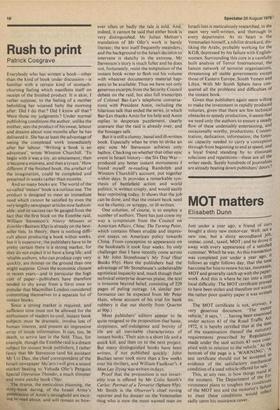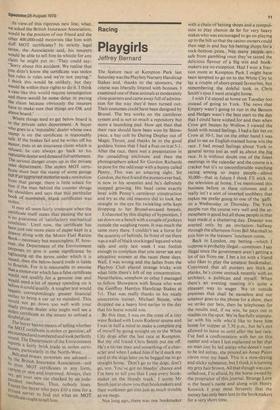MOT matters
Elisabeth Dunn Just under a year ago, a friend of ours bought a shiny new motor-car. Well, not a new one, but a shiny secondhand job. inrimac. cond., taxed, MOT; and he drove it away with every appearance of a satisfied customer. Which he was. As this transaction was completed just under a year ago. It follows as night follows day, that the time has come for him to renew his tax, insurance. MOT and generally catch up with the paperwork. And this is where he ran into a little local difficulty. The MOT certificate proved to have been stolen and therefore not worth the rather poor quality paper it was written on.
The MOT certificate is not, anywaY, very generous document. 'The nloWr vehicle,' it says, 6. . . having been examined under section 43 of the Road Traffic Ad 1972, it is hereby certified that at the date of the examination thereof the statutorY requirements prescribed by Regulations made under the said section 43 were complied with in relation to the vehicle.' At the bottom of the page is a 'WARNING A test certificate should not be accepted. as evidence of the satisfactory mechanic condition of a used vehicle offered for sale. el, t This, at any rate, is how things stand _ the moment. The Department of the PI vironment plans to toughen the conditions of the MOT test and the motorist's failure to meet these conditions would reflect sadly upon his insurance cover.
In view of this rigorous new line, what, we asked the British Insurance Association, would be the position of our friend and the Other 400,000-odd motorists like him with duff MOT certificates? In strictly legal terms, the Association said, his insurers Would be able to tell him to whistle for any claim he might put in: 'They could say: "Sorry about this accident. We realise that You didn't know the certificate was stolen but rules is rules and we're not paying." I think this would be unlikely, but they would be within their rights to do it. I think a case like this would require investigation and there would be some delay in paying the claim because obviously the insurers have to make sure that things are OK and above board.'
Where things tend to get below board is in the private sales department. A buyer who goes to a 'reputable' dealer whose own stamp is on the certificate is reasonably safe. If the brakes fail and he writes off his
Inotor, puts in an insurance claim which is refused, he can always go back to his reputable dealer and demand full settlement.
The serious danger crops up in the private sales department. The stolen MOT certificate must bear the stamp of some garage but if an aggrieved motorist seeks restitution from that garage, there is little solace for him if the man behind the counter shrugs his shoulders and says that thi§ particular book of numbered, blank certificates was stolen.
It may all seem fairly irrelevant when the certificate itself states that passing the test is no guarantee of 'satisfactory mechanical
condition.' Until now, the certificate has been just one more piece of paper kept in a
drawer along with the Motor Fuel Ration
Book—necessary but meaningless. lf, however, the Department of the Environment
Proposes to give it some significance by tightening up the terms under which it is issued, then the below-board trade is liable to flourish. For it is reasonable to assume
that a motor-car which has a false certificate would not qualify for a genuine one and
Would need a lot of money spending on it before it could qualify. A tougher test would require correspondingly greater financial
outlay to bring a car up to standard. This w.ould not go down too well with your Shady private dealer who might well see a Stolen certificate as the means to unload a doubtful car. t, The buyer has no means of telling whether .11 MOT certificate is stolen or genuine; all re e stamped and numbered and look perfectly ound. The Department of the Environment re
ports a fairly brisk trade in stolen certinc!t_tes, particularly in the North-West.
Belt-and-braces motorists are advisedbythe British Insurance Association—not trust MOT certificates in any form, s: r rent or new and improved. Always, they .get Your new car checked by an inde Rncdent mechanic. Thus, nobody loses. Cep the buyer who pays £10 a time for a Private survey to find out what an MOT certificate ought to tell him.



























 Previous page
Previous page